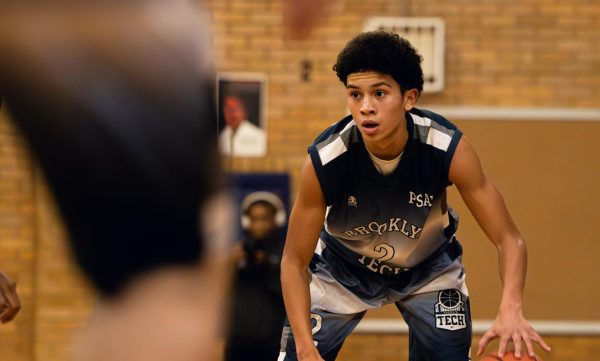The Pressures of Tech Wrestling
Brooklyn Tech’s wrestlers have had great success in city and state championships, making city finals four years in a row. However, this success has not come without its drawbacks. Wrestlers can endure drastic weight loss or gain, which can have serious mental and health effects. Extreme weight fluctuation, which often begins in high school, can become even more extreme in college and beyond.
“I wish there wasn’t so much of a weight-loss culture around wrestling,” Rebecca Silber (‘22), one of Tech’s top wrestlers, admitted.
In order to compete in a specific weight class, wrestlers must “make weight,” which can be a grueling physical challenge. Weight classes “are what keep it fair,” Julian Szetela (‘22) explained.
“I don’t want to go against someone who is significantly lighter than me or someone who is significantly heavier than me, because that’s unfair to our skills,” Silber added.
The real issues arise when wrestlers attempt to change their weight class. Before weigh-ins — which can happen only a few hours prior to a tournament — wrestlers will cut down an extreme amount of weight in short periods of time to go down to a lower weight class, of which there are 13. Then, the wrestlers restore their strength before the actual match, which is extremely difficult to do in a healthy way.
THE SCIENCE OF WEIGHT
The threat of changing weight for wrestling has been an issue for decades. According to Los Angeles Times reporter Jeff Myers, who studied the phenomenon of making weight in 1986, “the chances of dying after a contest are much greater for wrestlers than for athletes in other sports, and experts feel that the wrestlers’ ritual of rapid weight loss may be a contributing factor.”
Weight is measured through weight certifications (commonly referred to as weight “certs”) and skinfold measurements, a test that informs wrestlers of how much body fat they can realistically lose. “In the long run, I think weight certs really do help us stay healthy, manage our weight, and not go overboard,” Daler Durdimamedov (‘23) explained.
“You can only go down to 6% body fat. That’s what prevents people from cutting excess weight,” Coach Anthony Piscatello confirmed.
Although the experience of being weighed has been normalized, the practice is not endorsed by everyone. Silber believed that weight certs are “more of a shame thing.” As she explained People are singled out, and their weight is announced in front of the team, which is often followed by exclamations from their teammates.
SUFFERING THE SIDE EFFECTS
Once weight certs and other weight tests are completed, Tech wrestlers begin to start “cutting” (losing weight), or “bulking” (gaining weight), depending on the weight class they would like to compete in. Oftentimes, wrestlers put their health at risk in order to do so.
One anonymous male wrestler, uncomfortable being identified when discussing personal health, noticed that he was drained on a day-to-day basis. He added that cutting “did affect me, my energy levels were very low, my brain felt foggy, and my central nervous system was fried.” After an attempt to cut eight pounds in a week, he noted “that week I was mentally at my lowest.”
Mahir Adib (‘23) said, “People like to do this kind of stuff at the last minute and it leads to really negative effects on their body.”
Of the more extreme side effects of cutting, Silber stated “Yeah. I also don’t get a period,” as a result of weight cutting. The disruptions to diet can also be compounded, as she continued, “Every time you eat, you feel violently ill.”
According to Szetela, “cutting is one of the hardest things you could go through because you are depriving your body of everything it needs: food, water, rest. It’s mostly all mental.”
Though many wrestlers are not always able to, there are healthy ways of cutting or bulking — such as making a plan for cutting or bulking in advance, and creating a diet consisting of high protein for bulking or low calorie foods for cutting.
Beyond the short term health effects of cutting and bulking, many wrestlers’ self-view and confidence may be easily affected. “It screwed up how I thought about food and my body image,” an anonymous female senior reflected about her previous experience on the team.
Weight is constantly discussed on the team: “the girls definitely do (discuss ways to cut weight), like the teas that you can drink that will make you pee or something like lemonade or Gatorade that will pass quickly through you,” Silber added.
For the boys, it is discussed differently. The previously mentioned anonymous male recalled that it is often discussed in the showers, after practice: “Maybe one guy takes off his shirt and starts pinching at his belly fat, and goes ‘Oh I’m a little fat I have to cut a bit’”.
LEARNING THE SECRETS, FACING THE PRESSURE
Some of the older members on the team, such as Szetela, have learned weight-cutting “tips” since freshman year. Szetela explained that, when he first joined the team, some boys would sit in the basement with no ventilation: “You’d crank the heat and lay under mats with a trash bag under your sweaters.”
The previously mentioned anonymous female senior, who has been on the team since her freshman year, recalled, “My friends definitely had eating disorders. They would take laxatives right before a tournament.”
The culture of wrestling involves constantly thinking about weight, which is not inherently an issue but can manifest into one. “Even when I’m in the wrestling room, it’s not about learning the technique or drilling the best; it’s losing weight, losing weight, losing weight”, Silber emphasized. In Durdimamedov’s experience, “personally, I spend the entire day trying to maintain my diet.”
Additionally, due to the culture of wrestling, even if a team does not want to enforce harsh weight policy, wrestlers “know there are competitors… from other schools that will… cut down to a very low weight class for competitions, and that’s pretty daunting to think about,” Adib mentioned.
A bulk of the pressure wrestlers feel comes from the pressure that the players put on themselves. “I feel like my weight determines my self-worth,” Silber said.
The yearning to cut or gain weight dictates the lives of Tech wrestlers. “I would go to the scale and check my weight and that would determine what I ate. So either it could be like nothing, or since I had been eating nothing for other days, it would be binging on food,” the anonymous female realized.
COACHING CONSIDERATIONS AND PERSONAL CHOICES
Coaches can also play a factor in how wrestlers approach cutting and bulking. Players are never forced to cut or bulk, but some wrestlers do feel pressured to do so. Xiao Lin Chen (‘22) said that the coaches will not pressure changes in weight “unless they are a few pounds over, because that’s when they are like ‘Oh you should really go and run, I even told you not to eat the night before, why didn’t you listen.’”
“The coach is also some random dude who happens to be your coach. I don’t really want to talk to you about my insecurities around my weight because you’re just going to be like, get over it,” Silber reflected.
The wrestlers’ experiences vary, however. Some do not have an issue with cutting and bulking, nor do they feel an exorbitant amount of pressure to do so. “If we can’t make weight for instance for a tournament, they just bump us up to the next weight class,” Durdimamedov said.
“Forcing such dramatic weight cutting might lead to injuries which is the opposite of what coaches might want, they care about our safety first,” Adib pointed out.
“There’s no one person to hold accountable,” the anonymous female asserted. “It’s not [the coach’s] fault… sometimes I just wish they would say yeah, this is a problem, we should talk about it.” However, “They tried. I feel like they must know that we do it, but they don’t think there is anything they can do to change it because we’re going to do it anyway,” she concluded.
The coaches agreed. Coach Piscatello explained, “I cut a lot in high school and it kinda made the sport miserable for me.” Therefore, “I’m not going to get in a kid’s face and go, I need you to make 138… I’m never going to take food or water out of a kid’s mouth and say this is the weight you need to make.”
Most importantly, “We’re trying to teach kids how to properly diet as well,” Coach Liju Abraham said. In the past, the coaches have brought in a nutritionist to talk to the wrestlers. Several wrestlers have said that if a wrestler was planning to cut or bulk, a one-time talk with a nutritionist would not really discourage them.
To the extent that cutting and bulking is done, “All the weight cutting is done meticulously, and that’s why we have the scale and we tell the guys and the girls to weigh in everyday so that way we can monitor it,” Coach Abraham explained. “As we get closer [to a match] we are more hawk-like about their weights, standing over the scale, and saying ‘Why are you x number of pounds away?’ or ‘Hey you have x number of days you need to start working on that.’”
Despite the pressures and hardships wrestling can present, there is still a reason that approximately 20 wrestlers stay on the team. Many of them love how competitive the sport is and how it challenges and bonds them in ways that other sports cannot. According to Oliver Malkus (‘23), what makes the sport unique is that “wrestling is a lot closer than other sports because everyone takes care of each other, making sure everyone is doing the right thing and getting better.”
Hannah Koyfman (she/her) is the editor for Sports. Hannah enjoys learning from individuals around her...









































Jeff Roaches • Apr 26, 2022 at 3:53 pm
this is nothing, i.ve been wrestling with roaches for the past 50 years, they make formidable opponants, and would probably defeat the entire team in hand,to hand combat
Reff Joaches • May 23, 2022 at 1:04 pm
YOU!!!